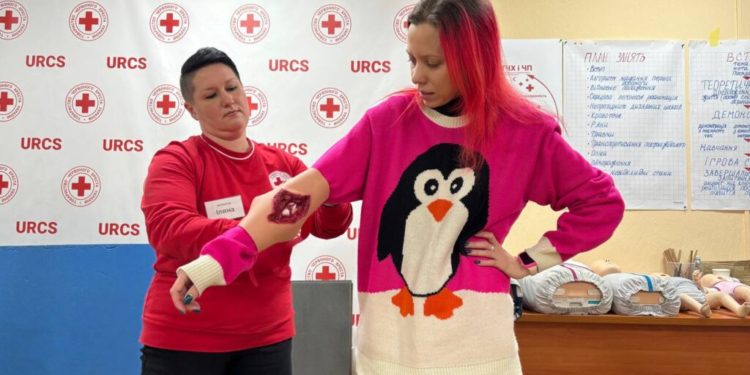How to stop bleeding? How not to get lost in a critical situation and provide the necessary assistance to victims in an extreme situation in a timely and correct manner? This is what Zaporizhzhia journalists learned at a training organized by the Zaporizhzhia Journalists’ Solidarity Center (JSC) of the National Union of Journalists of Ukraine (NUJU) at a specially equipped location of the regional organization of the Red Cross of Ukraine under the guidance of first aid instructor Iliana Cherniakova.
Iliana Cherniakova combined the theoretical part and practical exercises, thanks to which journalists had the opportunity to master key first aid skills, namely:
- detection and recognition of signs of internal and external bleeding;
- algorithm for providing first aid for critical bleeding;
- stopping critical bleeding using direct pressure, tamponade, and application of a tourniquet;
- transferring the victim to a safe position in case of shock;
- features of providing assistance in case of nosebleeds, traumatic amputation, and prolonged compression syndrome.
Journalists learned to use modern means of aiding, such as tourniquets, Israeli bandages, special bandages, etc. Since this is far from the first similar training for them, they had an idea of what and how to do it.
Under the guidance of the mentor, the training participants worked out in detail real-life scenarios of critical situations and the algorithm for providing assistance using improvised means, which they learned to make right away. They commented and shared their impressions. In particular, videographer Serhii Melnyk, who travels to shoot in front-line areas and places of battle (by the way, at the training, he played the role of a victim who was conditionally stopped bleeding during a traumatic amputation), noted:
“Working on the front line, I perfectly understand the importance of these skills and abilities for journalists. They give confidence that I will be able to provide first aid to others and myself if necessary. And even in the city, an extreme situation can arise now. This is the third first aid training for me, and I am somewhat familiar with the algorithm of action. But the coach is right: it is necessary to practice practical skills in order to act quickly and confidently. Because often this is what makes the assistance effective.”
And Kateryna Rozhdestvenska, the editor-in-chief of the SODA website, added:
“I decided for myself that from now on, I will always have latex gloves and a pair of bandages in my bag. It is not at all burdensome, but it will really come in handy to provide first aid for wounds and bleeding. And then I will act according to the situation. Today, we learned many useful and necessary things.
The event was an important step in increasing the participants’ readiness to respond to emergency medical conditions. The skills and knowledge obtained at the first aid training are critically important in war conditions, they can be decisive in difficult moments, saving people’s lives and health.
The algorithm of actions for providing first aid for wounds and bleeding:
- make sure that there is no danger;
- examine the victim, determine the presence of consciousness and breathing;
- call an emergency (ambulance) medical team;
- put on protective gloves; if there is no bleeding, raise the limb; apply a clean, sterile cloth and bandage to the wound;
- if the bleeding is severe – apply a pressure bandage to the wound and, if possible, simultaneously press the artery at a distance;
- if the bleeding has not stopped, apply a tourniquet (note the time of application);
- if the bleeding has stopped, the tourniquet can be loosened, but in no case should it be removed before the arrival of doctors;
- if the bleeding is venous, apply a sterile cloth to the wound (if there is none – a piece of cloth from clothing), apply pressure directly to the wound; raise the limb; apply a pressure bandage to the wound; cover the victim with a blanket or any item of clothing;
- if a person is crushed by heavy debris, in no case release them until you apply a tourniquet or tourniquet above the place of compression. Note the time of their application.
Call the Zaporizhzhia JSC at 096 277 5352 (Nataliya Kuzmenko and Valentyna Manzhura, the Zaporizhzhia JSC coordinators). The Center is located at 152 Sobornyi Avenue.
ABOUT JSC
The Journalists’ Solidarity Centers is an initiative of the NUJU implemented with the support of the International and European Federations of Journalists and UNESCO. The initiative is designated to help media representatives working in Ukraine during the war. The Centers operate in Kyiv, Lviv, Ivano-Frankivsk, Chernivtsi, Zaporizhzhia, and Dnipro and provide journalists with organizational, technical, legal, psychological, and other types of assistance.
ABOUT UNESCO
UNESCO is the United Nations Educational, Scientific, and Cultural Organization. It contributes to peace and security by promoting international cooperation in education, sciences, culture, communication, and information. UNESCO promotes knowledge sharing and the free flow of ideas to accelerate mutual understanding. It is the coordinator of the UN Action Plan on the Safety of Journalists and the Issue of Impunity, which aims to create a free and safe environment for journalists and media workers, thus strengthening peace, democracy, and sustainable development worldwide. UNESCO is working closely with its partner organizations in Ukraine to provide support to journalists on the ground.
The designations employed and the presentation of material throughout this digest do not imply the expression of any opinion whatsoever on the part of UNESCO concerning the legal status of any country, territory, city, or area or its authorities or concerning the delimitation of its frontiers or boundaries.
The authors are responsible for the choice and the presentation of the facts contained in this digest and for the opinions expressed therein, which are not necessarily those of UNESCO and do not commit to the organization.
Nataliya Stina
Photo by Dariya Zyrianova and Valentyna Bystrova

 THE NATIONAL UNION OF
JOURNALISTS OF UKRAINE
THE NATIONAL UNION OF
JOURNALISTS OF UKRAINE
















Discussion about this post